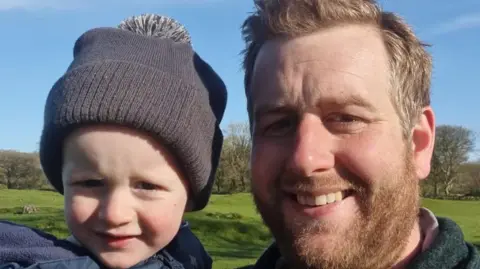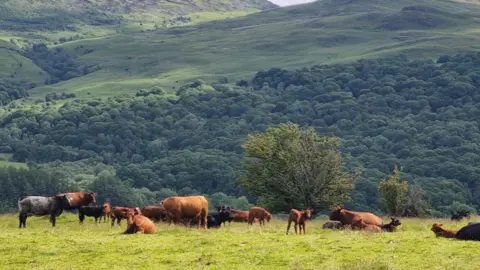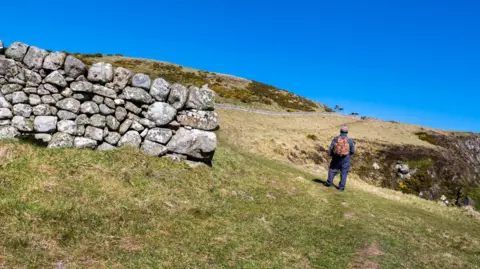Why do farmers fear a new Scottish national park?
 Neil Austin
Neil AustinThere is no mistaking the passion in Neil Austin's voice when he talks about Galloway.
He is the third generation of his family to farm at Gatehouse of Fleet and fears national park status would harm his business and the region as a whole.
The area was recently selected as the preferred site by the Scottish government to secure the designation, with consultation planned before a final decision.
Campaigners say it could deliver "transformational economic and environmental benefits" but Neil is not convinced.
 Neil Austin
Neil AustinHe first heard about the prospect 10 years ago but nothing he has been told since then has made him believe it would be good for Galloway.
He describes the proposals as vague and is concerned about the implications for working in the countryside.
"You will get quite a lot interference from a body which will be unelected," he said.
"Galloway is beautiful and bonnie because of the generations of farmers and land owners who have worked to make it that way.
"You don't get the mosaic of hill and improved ground that we see in Galloway without generations of people working on the land."
He said his father taught him that a farmer should hand on land to the next generation in "at least as good" a condition as when you took it on.
"That's what we as farmers and land owners are trying to do," he said.
"We're in a business to make enough money to have a standard of life and also to continue the farm on and making improvements to the farm."
He said enough controls were already in place in the next band of agricultural support funding which was based on biodiversity, climate change and productive agriculture.
"So why do we then need a national park?" he asked.
He questions what would make national park officials better qualified than he - a third generation farmer of the land - to decide what is done there.
He is also concerned about the implications of attracting more people to the region.
"I'm exceptionally passionate about the area and I think it's a beautiful part of the world," he said.
"It's made so by the people who are working and living here just now.
"I fully appreciate anybody who's trying to promote it for what it is."
 Getty Images
Getty ImagesHe said, however, there were problems caused by the visitors they already get without national park status.
"We're getting a lot of wild campers camping in our farms - they don't tidy up," he said.
"They come in, they park in their cars. It's not wild camping - it's a free holiday.
"Wild camping is only if you're taking a bike tour around the country and you're stopping off camping for the night and you don't leave any mess, but coming in with the car having a free holiday isn't wild camping."
He said the infrastructure of the area was already struggling to cope with the numbers of people coming.
"My ultimate goal is not to have a national park," he said.
"If you take away the farmers because of interference from a national park, then Galloway will no longer look as bonnie as it does now."
'Nothing to fear'
The Galloway National Park Association (GNPA), however, insists the status could be good for everyone.
"Farmers, landowners and those who work on the land have nothing to fear and everything to gain from a Galloway national park," said trustee Gordon Mann.
He said it could guarantee investment - likely £8m to £10m a year - and also have powers to help the industry reduce carbon emissions and increase biodiversity.
"Despite some people’s fears, the park authority would have no powers to interfere with farming or land management, and everything they do is with agreement," he said.
"We encourage everyone to find out all they can about a potential Galloway national park from NatureScot before making up their minds.
"This is a one-off chance to benefit from major investment designed to help Galloway thrive and prosper and should not be lost."
He said the changes in planning were relatively small as were targets to increase tourism and help sustain businesses and generate jobs.
Time will tell if the consultation process can bring the two sides close enough together to allow the park to proceed.
